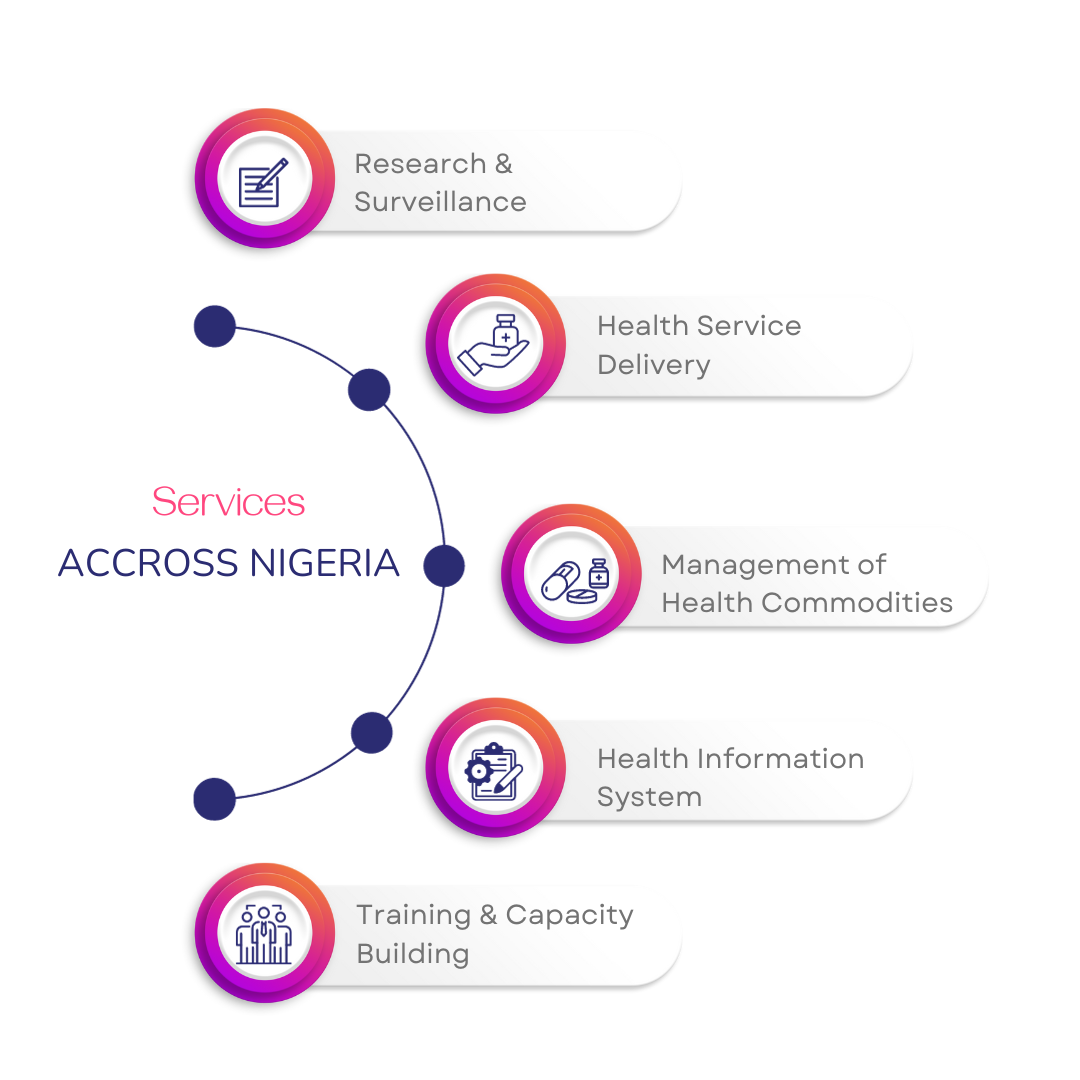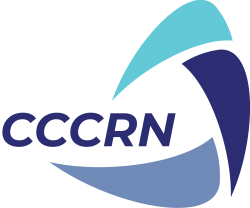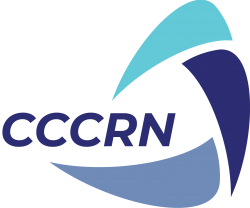SERVICES WE PROVIDE
Our capabilities are arranged into a holistic approach that offer unique service experience that meet the expectations of our beneficiaries.

Health Service Delivery
HIV Testing and Counseling
CCCRN has strengthened hospital and community structures to implement standardized testing protocols for HIV testing and counseling. Our approach bundles HIV tests with prevention packages and are culturally delivered with sensitivity that improves/encourages uptake, particularly for people at high risk of HIV infection and key populations.
CCCRN has counseled and tested over 10 million Nigerians through a mix of facility and community level testing services. Our collaboration with churches and congregational settings under the Healthy Beginning Initiatives Baby Shower project has resulted in an unprecedented acceptance for partner testing in PMTCT settings. CCCRN has provided testing services to hard to reach populations such as key populations, homeless persons and nomadic herdsmen. CCCRN applies quality assurance protocols that guarantee the integrity of testing and counseling services and results.
Applying the use of Dried Tube Samples for proficiency testing, all testing points are periodically assessed for proficiency and required corrective actions.
HIV Care and Treatment
From 2010 till date, CCCRN has implemented large comprehensive HIV care and treatment projects (CDC/CHAN-CHARIS Project: 2010–2012; CDC/SEEDS project 2012-2017; CDC/APIN iCARES project: 2017-2022) in Plateau, Kano, Enugu, Ebonyi Imo and Benue States. These projects built strategic partnerships with Nigerian health institutions and communities in implementing and evaluating HIV/AIDS prevention, and care and treatment programs.
The project strengthened over 800 health facilities that include a mix of tertiary, secondary and primary health facilities and included government, private and faith-based institutions. Through these facilities, CCCRN provided comprehensive care and treatment services to over 100,000 HIV-infected patients and their family members.
Orphans and Vulnerable Children’s (OVC) Program
CCCRN has strengthened capacity of local community based organizations to provide comprehensive OVC services in six states (Imo, Ebonyi, Enugu, Cross River, Akwa Ibom and Benue State) to more than 380,000 orphans and vulnerable children and 54,000 households many of whom have been graduated from the program.
Through the USAID ICHSSA award, the program has recorded several notable success stories in household economic strengthening as a sustainable means of comprehensive OVC service delivery, collaboration with State and local government to deliver basic services and detect and respond to child rights violations; and Collaboration with ccommunities to promote child and family friendly, gender and HIV sensitive cultural norms and practices.
Tuberculosis Care
CCCRN has developed and implemented innovative approaches to increase TB case detection among itinerant Fulani in Kwara and Niger State using community volunteers through a WHO TB REACH grant in 2014. The project screened 50,000 nomadic herdsmen for Tuberculosis and helped build community structures for sustainable screening and referral of active TB cases using modified clinical tools and mobile technology. The project utilized mHealth solutions for reportage, identification and care continuity. The innovations and capacity were transferred to the host government through the National TB program to ensure sustainability.
Through a sub award from KNCV, Center for Clinical Care and Clinical Research (CCCRN) has started implementing a 5 year USAID funded TB LON on April 2020, for TB control in Anambra, Delta and Imo States. The project will improve access to high quality person-centered, TB, DR-TB and TB/HIV services and reduce TB transmission through private sector partnership.
Capacity Building For frontline Health workers
CCCRN has played significant roles in strengthening human resources within the health sector in Nigeria. Our approach ensures cadre to cadre training and mentorship with extensive supportive supervision. Beyond technical assistance offered on CCCRN care and treatment projects, the organization has received dedicated funding for human resource capacity development through CDC funded cooperative agreements – 1U2GGH000946 and 1U2GGH000916.
As an accredited CME provider with the Medical and Dental Council of Nigeria, CCCRN provides regular update opportunities for medical professionals in all the states of our work through private funds or funded through our partnerships with AbbVie, National Agency for Control of AIDS and the World Bank.
Institutional strengthening and Capacity Building of local organizations
Our partnership framework includes several sub grantees, service delivery facilities and the host governments. We have developed an efficient engagement structure that enhances their technical, programmatic and finance processes for program implementation, monitoring and evaluation through capacity building and mentoring.
These platforms include monthly reporting and feedback processes, quarterly review meetings, quarterly technical assistance and structured knowledge management sessions. Under the separate prime Awards, CCCRN has sub-granted organizations that includes Christian Health Association of Nigeria, Solina Health, Excellence and Friends Management Consult and several CBOs with distinct scope of work in focus states.
Laboratories and broad diagnostic strengthening
CCCRN has supported a vast network of laboratories, strengthening their capacity for multiple diagnostic and patient monitoring platforms. Our team includes equipment maintenance experts, Quality experts, ASLM trained professionals and SLMTANs.
Under the SEEDS project, CCCRN supported 48 clinical laboratories for CD4, Chemistry and Hematology platforms, 8 GeneXpert platforms and 2 molecular PCR laboratories in University of Nigeria Teaching Hospital and Annunciation Hospital Enugu. Through a bike rider sample referral mechanism, the project ensured an efficient networking of satellite sites to nodal laboratories for analysis of patient samples.
CCCRN provides technical assistance for Quality assurance for tests through multiple strategies and support accreditation for eligible laboratories.
Training and Capacity Building
CCCRN provides technical assistance for Quality assurance for tests through multiple strategies and support accreditation for eligible laboratories.
Health Information Systems
Quality Improvement
Our goal for quality improvement is to maximize patient health outcomes, build capacity of service providers for sustainable quality of care and to improve overall quality of HIV/AIDS and other diseases care and treatment programs through data collection, analysis and utilization for evidence based approaches. CCCRN has institutionalized principles of the NigeriaQual in more than 300 health facilities and subnational government units.
We apply recognized CQI models rooted in improvement science that utilize Plan-Do-Study-Act (PDSA) cycle and Small Test of Change (STOC) to diagnose problems, develop improvement plans, implement the plans and evaluate results continuously. In 2016, a CCCRN supported facility, Iji Nike Cottage Hospital received an award as the best site nationally in the NigeriaQual program funded by CDC.
Technology Applications for Strategic Information, Monitoring and Evaluation
Through its capacity building awards, CCCRN has established a web based platform to provide virtual capacity building opportunities for health care work force. It provides additional learning resource other than those covered in the conventional training sessions. A training database has also been developed to capture information on trainees and their capacity building efforts. In the future, this will be expanded to link trained health workers to facility GIS coordinates and will provide visual and enhanced information for health workforce distribution for decisions on recruitment, deployment or redeployment of trained health workers.
CCCRN deployed efficient, robust but flexible Electronic Medical Records in all its treatment facilities under the care and treatment award. Verifiably, CCCRN was the first implementing partner in Nigeria to demonstrate that data can be extracted from facility EMR into the National Data Repository and all its supported sites had such capacity as at the closure of the award. CCCRN also partnered with the University of Maryland to provide digital solutions to data collection, analysis and display for reporting of notifiable diseases under the Global Health Security award.
Grants Management Capcity
CCCRN has demonstrated the capacity to manage projects and funds according to national and international best practices. CCCRN has managed over 65 million USD within the last 12 years on 15 projects funded by the US Government, World Bank/NACA and WHO. CCCRN has adhered to the high compliance and funds management standards required by these donors.
Health System Financing
CCCRN has adhered to the high compliance and funds management standards required by these donors.
Research and Surveillance
CCCRN deployed efficient, robust but flexible Electronic Medical Records in all its treatment facilities under the care and treatment award.
Research Capacity
CCCRN has implemented clinical and operational research activities funded through CDC, NIH, Clinton Health Access Initiatives, GEANCO and other private streams. These include Adolescent Coordinated Transition study to Improve Health Outcomes among Nigerian HIV Youth, (NIH 1R01HD089871-01), Tuberculosis prevalence survey among HIV infected clients in South East Nigeria (CDC 5U2GGH00868-5), In-service Training Impact Evaluation study (I-TIE) to assess impact of in-service training on work practices in Nigeria (5U2GGH000916-04), Building and Strengthening Infection Control Strategies to Prevent Tuberculosis in Health facilities in South East Nigeria (CDC 5U2GGH00868-03) and Intervention for Sustained Testing and Retention (iSTAR) Among HIV-infected Patients (NIH 1R01HD087994-01), among others.
Disease Surveillance and Notification
In consortium with the University of Maryland, CCCRN was awarded GH15-1632 Global Health Security project to expand efforts and strategies to protect and improve public health globally. Following the 2015 Ebola Virus epidemic, the project strengthened reporting systems for early detection and response for diseases of public health importance.
On this project CCCRN supported the development of clinical and laboratory capacity for disease detection and notification. The project also piloted solutions for data collection from pharmacies, patent medicine vendors and also involved in antimicrobial resistance surveillance efforts.
Vaccine Management
Through funding from UNICEF, in collaboration with NPHCDA and other stakeholders, Centre for Clinical Care and Clinical Research (CCCRN) conducted an independent physical stock count and audit of vaccines and devices in all the functional Cold & Dry stores in Abia, Anambra, Ebonyi, Enugu and Imo states. The exercise was conducted in the Zonal cold store, State and Local Government Cold and dry stores (SCS) across the 5 states and 926 Health facilities. The activity included training of field enumerators and Cluster Supervisor on inventory management for cold chain commodities in accordance with the time lines stipulated by the National Logistics Working Group (NLWG).
The project provided evidence for forecasting requirements at National, Zonal, State LGA and Facility disaggregated by programmatic areas for 2020.
Tuberculosis and Antiretroviral commodity Management
Notable achievements include: capacity of the staff in assigned SDPs on pharmacovigilance, Adverse Drug Reaction (ADR) reporting, Logistics management of Health Commodities and use of Logistics Management Information System (LMIS) tools; quality logistics records, ensuring commodity security and effecting best practices in storage/warehousing
Product and Supply Management Technical Working Group (PSM TWG)
CCCRN played a pivotal role in the establishment of PSM TWG and Logistics Management Coordinating Unit (LMCU) in many states, focused on capacity building and increasing supply chain ownership by State governments.
CCCRN supported these states in development of PSM TWG and LMCU TOR, developing integrated monitoring and supportive supervisory visits (iMSVs) checklist and conducting iMSV in health facilities to ensure smooth implementation of supply chain activities; address supply chain bottle necks at the state level Program level and ensure commodity security in the States by facilitate inter-IP commodity transfers.
Maturity Model Assessment
As a drive towards continuous improvement, the Pharmacy and Supply Chain Management Unit periodically performs end-to-end supply chain self-diagnosis of their operations using the Global Health Maturity Model Assessment Tool to assess supply chain needs. This is done in collaboration with Association for Supply Chain Management (ASCM) through funding from Bill and Melinda Gates Foundation.
This tool highlights the most problematic constraint or weakest link to achieving supply-chain goals. Therefore, focusing efforts on; and removing this weakest link is a fast and effective way to improve performance.
Pharmacovigilance and Adverse Drug Reaction Reporting
CCCRN places high importance on Pharmacovigilance by promoting regular screening of patients for adverse drug reactions (ADRs) and ensuring proper monitoring, management, documentation and reporting of all identified adverse drug reactions.
Clinicians, Pharmacy focal persons and adherence counsellors are routinely trained and mentored onsite on ADR screening, monitoring and reporting. We deployed ADR monitoring tools (adverse drug reaction screening forms and Pharmacovigilance yellow forms) across all supported facilities to ensure proper documentation of ADRs.
All newly initiated patients on ART or INH and patients transitioned to the new molecules (TLD, LPV/r pellets and ABC/3TC) are particularly monitored for ADRs.
To further to strengthen the process of monitoring of ADRs, CCCRN provide technical support and facilitates bimonthly Pharmacovigilance meeting in all the facilities.
Management of Health Commodities
CCCRN played a pivotal role in the establishment of PSM TWG and Logistics Management Coordinating Unit (LMCU) in many states, focused on capacity building and increasing supply chain ownership by State governments.
© 2023 CCCRN. All rights reserved.

